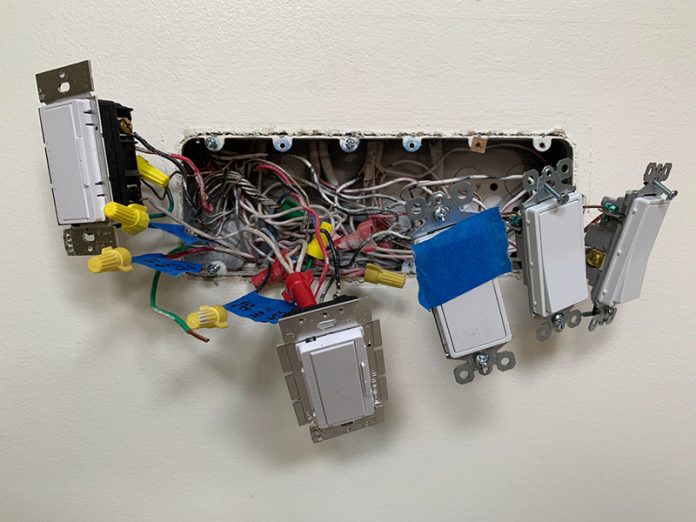Whether you are building a new house or trying to renovate it, electrical wiring is a huge project you shouldn’t take lightly. You may need to rewire your home if your wires are old or faulty, which can be dangerous.
Faulty wires can cause severe accidents and fires. Thus, it’s best to have your faulty wires tested and worked on by a professional electrician as soon as possible. In the UK, rewiring a house can cost about £1,500 to £9,000, depending on the house’s age, size, and construction material.
For example, the price for rewiring a three-bedroom flat is usually around £3,500 to £5,000. Plus, this type of task can take up to six to seven days to complete.
Comparing Quotes Could Save You Upto 33%:
How Much Does It Cost to Rewire a House?
To help you understand better, we’ve provided a table detailing the typical cost of rewiring a house and the estimated time frame. However, keep in mind that all prices and timeframes are approximations.
| SIZE OF THE REWIRING JOB | TIMEFRAME | AVERAGE COST |
| 2-bedroom flat | 5-7 days | £3,000 |
| 2-bedroom house | 6-10 days | £3,000-£4,000 |
| 3-bedroom semi-detached house | 10-14 days | £4,000-£5,000 |
| 4-bedroom detached house | 12-15 days | £4,500-£6,500 |
The cost of hiring a professional electrician will vary across the country. Plus, London and the Southeast typically have higher labour costs than other parts of the country. Thus, we intend this table to serve only as a guideline.
Another effective way to estimate the cost of a rewiring job is by using an online cost calculator. However, we highly recommend inviting an electrician to have a look at your home. An electrical expert is the best person to assess your house and provide a more accurate quote.
Suppose you don’t know where to find a professional electrician, not to worry. You can quickly locate an electrician near you on Bark.com.
Comparing Quotes Could Save You Upto 33%:
Rewiring a Flat
You don’t have to worry about spending lots of money when rewiring a flat. A flat is generally the cheapest property to rewire due to its small size. Plus, the upside of rewiring a flat is that it requires less labour and material. However, this task can get complicated if you can only access the wiring from the flat below or above you.
If you find yourself in such a condition, you’ll need to gain access to the next property before you can rewire your flat. On a different note, you can expect to spend nothing less than £2,500 when rewiring a two-bedroom flat.
You may have to spend more than that, depending on the size of the property. You also have to consider the ease of access to the electrical panel and the number of rooms. Plus, rewiring a two-bedroom flat can take up to five to seven days.
On the other hand, rewiring a one-bedroom flat requires less time and money. Moreover, it usually takes three to six days to finish such a project. You can also expect to spend between £1,000 and £1,800 on your rewiring project.
Comparing Quotes Could Save You Upto 33%:
The Cost of Rewiring a House
The cost and duration of rewiring a house depend on the size of the property, the number of rooms, and the type of fittings it has. For instance, rewiring a small two-bedroom terrace house will cost between £3,000 to £4,000. Also, you can expect to spend nothing less than £1,500 to acquire the materials.
In addition, rewiring a small two-bedroom terrace house usually takes about eight days. On the other hand, a medium-sized three-bedroom semi-detached house will take longer (about 10 to 14 days) to complete.
Plus, the materials for such a project can cost about £1,300. Expect to spend roughly £4,500 on a medium-sized house with three bedrooms. Lastly, an electrician can take up to two weeks to finish the wiring of a detached four-bedroom property.
It will cost an average of £5,500 to finish the wiring of a detached four-bedroom property. Of course, the total costs of rewiring such an apartment will depend on the number of rooms on the property.
Comparing Quotes Could Save You Upto 33%:
House Rewiring Cost Factors
The total costs and duration of rewiring a house depend on various factors, and these factors include:
-
Labour
One of the main factors that affect the cost of replacing electrical wiring is labour. Typically, the largest part of the total cost goes toward the labour required to finish the electrical wiring installation. Hence, it’s understandable that one of the main cost factors is the complexity and size of your residential electrical system.
Of course, you are aware that you must hire a licensed electrician to rewire your home. Most professional electricians charge per hour. Further, you should expect the electrician to have covered 100 square feet of wiring after an hour of work.
In the UK, hiring a licensed electrician per hour costs about £35 to £60. However, larger and more populated cities are usually at the higher end of the scale. Also, prepare to spend more money on labour if you’ll be changing the outlets or electrical board installed in your apartment.
Lastly, note that you can calculate your house costs per square foot. For example, it should cost you around £2 to £4 per square foot when rewiring a residential house.
-
Fittings
Another expense you need to worry about is the price of the switches, wiring, lighting fixtures, and sockets. Also, the cost of these items varies depending on the materials used in manufacturing them.
For example, electrical fittings in white plastic are usually the cheapest material in the market. Plus, you can find them in most households. On the other hand, lamp sockets, wall sockets, and light switches are all made from the same white plastic material, despite having different designs.
Also, you can invest in various coloured brass, chrome, stainless-steel or plastic fittings if you wish. If you decide to take this route, ensure you closely monitor your expenditures to avoid going overboard with your expenses.
For a two-bedroom terraced house, quality and basic white plastic fittings can cost you between £800 and £1,000. However, using higher-quality fittings for the same property will raise the cost by at least £1,500.
-
Bathrooms and Kitchens
The next factor on our list is bathrooms and kitchens. Compared to other rooms in the house, The kitchen needs more electrical outlets than other parts of the house. For example, you may need electrical outlets for your cooker, dishwasher, washing machine, etc.
Besides, most UK homes are designed with heavy-duty circuits in case you have electric showers. Plus, you may need to plug in a shaver point one day, which supplies lower than average electric current.
Both the bathrooms and kitchens have their electrical outputs close to water supplies. Thus, this part of the house must comply with stricter Building Regulations.
According to the Building Regulation, all electrical switches in the bathroom must be controlled by a switch outside the room or a pull cord. Likewise, it would be best to place electrical switches in the kitchen far from the sink to prevent water splashes.
-
Conduit and Trunking
You must protect your electrical cables from damage to comply with the regulations. You can protect your cable by burying them within our walls. If your walls are made with timber-frame plasterboard, you can fit the wires within the wall before covering up the plasterboard.
However, if your walls are made of solid masonry, you can have the electrician chisel channels into the walls to bury the cables. This process is known as chasing. Placing plastic conduit within the chase and pulling the wires through it will protect them from the plaster’s corrosive nature.
The electrician buries the installation by covering the conduit with plaster and smoothing it. So, how do you hide your cables on timber or solid stone walls without damaging the aesthetic? You can work around this by hiding the cables within trunking that is fastened to the wall’s surface.
Hiding cables on surface-mounted trunking is easier due to their clip-on lid. A conduit costs between £1 and £3 per 3m length, whereas white plastic trunking ranges from £3 to £5 per 3m length. The style and width also affect the prices of these materials. Besides, most tradesmen receive preferred discounts from suppliers, making it possible to get these materials at a lower price.
-
Waste
One issue you’ll need to deal with when rewiring your property is waste. The electrician may try to work with the old conduit installed below the wall’s surface to reduce waste. However, this isn’t always possible, giving the electrician no option but to chase out the wall and replace the old wiring with a new wire.
Changing your old wires will produce waste materials such as masonry rubble, cable, copper fittings, and plastic waste. However, these waste materials are valuable, so ensure you recycle them. Usually, rewiring produces only a small amount of waste, which the electrician can quickly dispose of in waste bags.
However, you may need the help of a small skip if there’s a lot of waste. Hiring a small skip usually costs around £90 to £150 a week, depending on the size.
-
External Electrical Wiring
You can use the opportunity to fix or repair external power points and lighting when rewiring your house. However, the cost of this job largely depends on the complexity of the external wiring. Moreover, it would be best to consider how far the wire will travel from your house to the external circuit.
If the electrician needs to replace the external wiring, you may have to remove some plants and dig trenches to gain access to it.
-
Security Features
When rewiring their house, most people want to install CCTV cameras, smoke alarms, and burglar alarms. Also, most people use this opportunity to install an electric garage door or a lock on their driveway gate. Of course, the electrician can handle most of these tasks.
However, you may have to hire a specialist installer if your task is too complex for the electrician. Usually, installing a CCTV camera costs roughly £20 for the less expensive cameras. On the other hand, installing an outdoor security light can cost between £30 and £70 per piece.
Further, installing a burglar alarm costs around £100. However, you may have to spend between £150 and £200 to have a specialist install the device.
Comparing Quotes Could Save You Upto 33%:
Electrician Day Rates
The cost of hiring an electrician largely depends on the electrician’s experience level and the part of the country you live in. Compared to other locations, hiring an electrician typically costs more in places like London and Southeast England.
The disparity between that region and the rest of the country may be as high as 20%. That said, most electricians will charge you about £45 per hour. Plus, the electrician’s labourer usually charges between £15 and £20 per hour.
Electrical Standards and Regulations
You risk injuring yourself and causing a fire hazard if the electrical components and installation method don’t comply with regulatory standards. First, an electrician must pass a Level 3 NVQ in Installing Electrotechnical Systems and Equipment and Electrotechnical Services.
Also, the installer must have undergone a recognised apprenticeship and work experience in the field before being identified as competent. Moreover, any electrical components used on UK soil must adhere to the appropriate British Safety Standards.
Further, any installation or repairs made to electrical installations in a domestic setting must be covered by Part P of the UK Building Regulations. According to the regulations, electrical installations must be reported to the closest building control office or done by a Part P certified electrician.
Also, note that several trade bodies regulate electrical contractors’ activities in the UK. Since these organisations only accept competent electricians, anyone who belongs to them is highly qualified. Here’s what to look out for when choosing an electrician:
- ELECSA: This association assesses its members annually to ensure that their work satisfies IET Wiring Regulations, BS 7671, and other standards.
- ECA: ECA stands for Electrical Contractors Association, and this association represents electrical contractors, designers, and customers.
- NICEIC: NICEIC stands for National Inspection Council for Electrical Installation Contracting. Plus, this organisation is in charge of inspecting and providing training services for professional electricians.
Comparing Quotes Could Save You Upto 33%:
Electrical Installation Condition Report
Electrical Installation Condition Report (EICR) documents damages and flaws in the functioning of the electrical wiring system and components. According to the EICR report, you must test various electrical circuits to ensure the electrical equipment is safe.
The results of this electrical inspection will determine whether or not your home needs some rewiring. In most cases, you must check your home at least once every ten years for private properties and once every five years for rented properties. Also, an electrical inspection must be done once you sell or move into a new house.
Note that having an EICR doesn’t mean you must rewire your property. The purpose of an EICR is to keep you updated on the safety of your electrical circuits and components. If the EICR recommends that your property needs rewiring, you must do so right away.
For example, houses with old aluminum wiring and knob and knob and tube wiring can’t handle the electrical needs of modern appliances. During the inspection, the electrician may notice the issue and ask you to replace your existing wiring.
However, if you ignore the report, your property will be deemed unfit for occupancy, and your homeowner’s insurance will be void. As a reminder, note that only electricians that have been certified by Part P can test and issue an EICR.
Moreover, you’ll have to cover the EICR costs in addition to the rewiring costs. The fees will vary depending on the size of your property. However, you can expect to spend between £100 and £250 to get an EICR for a flat. A house might cost between £150 and £350, depending on the size and age of the electrical service panel.
What Does a Rewire Involve?
The first step is to get an EICR. An EICR will help you identify any electrical system or circuit that doesn’t comply with regulatory standards. During the inspection, the electrician will:
- Consider the condition of your light fixtures, switches, wiring, and power sockets. Further, your wires must have the proper colour coding and PVC sheathing.
- Consider the condition of your consumer units and domestic fuse boxes.
- Test the load on your electrical circuit.
- Check the earthing and bonding.
- Check the wear and tear of the components.
- Testing circuit breakers.
- Check installation polarity.
- The results of the inspection will determine whether or not your property needs new wiring. If the electrician finds any faulty electrical components, he’ll replace them with new ones.
- Replace any spurs, cable or ring mains going to the distribution board. Likewise, fix any surface damage in the walls, ceilings, etc. If the electrician can’t remove the old wiring running from behind the wall, they may leave it in place. However, they’ll disconnect and cut the cables to prevent reconnection.
- Make changes to the consumer unit or fuse box, if necessary.
- Replace damaged or old fittings.
- Bond all metal fixings, including domestic water and central heating pipe.
Wiring Components
Next, let’s have a look at the different components you need to rewire a house:
- Most electricians use copper wires for rewiring jobs. Plus, these wires are coated with a colour-coded PVC sheath. Some electricians use aluminium wires instead of copper wires, but that isn’t very common.
- Next, we have your wall sockets and light switches, usually made from PVC or thermoplastic material. Wall sockets and light switches are also available in other materials, including chrome, stainless steel or brass. However, note that these materials are usually more expensive than brass. If the electrician uses a metal, ensure they bond the front plates to earth. Metal conducts electricity. Thus, bonding is essential to prevent electrocution.
- Next, we have junction boxes, which are plastic boxes with electrical connectors inside. This is the material your electrician uses to connect cable lengths.
- Electric shower and cooker switches are entirely different from the standard components. Cookers use a 6 mm twin and have an independent circuit which leads back to the consumer unit. Plus, their cable has a 45 amp rating and a 32 amp circuit breaker. Moreover, electric showers have an independent circuit connected to a high-current wire directly from the consumer unit.
- Electricians also install bathroom light pull switches to prevent wet hands from touching potentially live objects.
- Lastly, we have galvanised metal back boxes. These metal boxes are inserted into masonry walls to protect the socket cover or switch from moisture and damage.
Comparing Quotes Could Save You Upto 33%:
Hiring an Electrician – Top Tips
One of the best ways to find a qualified electrician to work on your home’s wiring is to ask questions. Ask your friends or loved ones about which electricity company you can find a good electrician. Also, you can visit Bark.com to locate a competent electrician near you.
Besides, you can go for reputed companies or organisations that adhere to regulatory standards. For example, getting an electrician from Part P is a good idea because they adhere to Building Regulations and other regulatory standards.
Ask Questions
As stated earlier, asking questions is the best way to find a competent electrician. Here are some questions to ask an electrician before hiring them:
- The electrician must have experience in house electrical wiring so ask about his previous work. Further, you can get references and follow up with them. Do your homework and ensure the electrician has previously worked well and professionally.
- Next, inquire about their qualifications. Are they members of any recognised organisation such as NICEIC, BSI, and STROMA? Also, go for electricians that work in accordance with the Part P of the UK Building Regulations. Such an electrician can provide you with safe and high-quality services. You can also visit your local council and ask for a list of competent tradesmen within your region.
- Before hiring, inquire about the electrician’s service charge. Ask the electrician to detail their charges and give a breakdown of the services they provide for the price.
- Don’t hire an electrician because they have the cheapest quote. In most cases, electricians who offer a cheap quote end up doing a lousy job. Usually, most of the quotes you’ll receive will be somewhat similar. Also, don’t go for electricians that charge far more than the normal rate. An exception is when they are very good with their work, and you can afford their services.
- Make sure the electrician can provide a certificate for the services rendered. If they can’t, then it’s best to steer clear.
FAQs Regarding Rewiring A House
1. Can you rewire a house without removing walls?
Yes. an electrician can go about his electrical work without opening walls. Most electricians often leave a cable hanging or drawstring in a conduit to make it simple for other tradesmen to make repairs. If this isn’t available, the electrician will disconnect the existing wire and connect a new cable in a more convenient location.
2. Are old fuse boxes illegal?
You can use your old fuse boxes as long as they are electrically safe and meet the legal regulations when it was installed. Otherwise, you may have to replace the old boxes with a modern circuit breaker distribution box.
3. How disruptive is rewiring a house?
Rewiring a whole house takes a lot of work, and things can get messy during the first fix. The electrician has to replace the old cables with new ones. However, the second fix is less disruptive and involves fitting the sockets, switches, connecting the wires, and final testing.
4. How often should you rewire a house?
According to the EICR, you need to run an electrical inspection at least every ten years if you live in a private home and five years if you live in a rented apartment. Plus, this inspection must be carried out when the property changes occupants.
The results of this inspection will determine whether or not you need to rewire your house. However, note that electrical standards and regulations experienced significant changes between the 1950s and 1970s. Thus, you’ll have one or two things to change if your house was built during that time.
5. Can you rewire Or wire your home DIY?
Unless you’ve undergone training, it’s best to leave the job to the professionals. Rewiring a house can be a dangerous job, and you can cause fires or injuries if you mix things up.
However, you can carry out minor tasks such as changing your outlet or switching. Ensure you leave the larger projects, such as rewiring your bathroom or kitchen, to the professionals.
Find A Qualified Electrician
Rewiring an apartment can be a dangerous job in the hands of a novice, and hence, it’s best to leave the task to the professionals. The costs of rewiring a house vary depending on the size of the house, location, fittings, and other factors.
However, you can expect to spend between £3,000 to £7,000 to rewire your house. Also, ensure you do your homework when choosing an electrician. As a tip, you can find competent electricians near you on Bark.com or visit your local council.
Your local council can provide you with a list of competent tradesmen within your region. When hiring an electrician, ask about their work experience and qualifications. Plus, ensure the electrician is a member of a recognised body such as BSI, ELECSA, NICEIC, and NAPIT. Lastly, go for electricians that comply with Part P of the UK Building Regulations for quality services.
Comparing Quotes Could Save You Upto 33%:
Disclaimer: This article contains sponsored marketing content. It is intended for promotional purposes and should not be considered as an endorsement or recommendation by our website. Readers are encouraged to conduct their own research and exercise their own judgment before making any decisions based on the information provided in this article.


































